
Source: Lunarch Studios
Islands of Insight is a recent puzzle game taking place in a shared online world. This, by itself, is an extremely ambitious concept, because normally “puzzle” and “MMO” do not go together. I know only of two other games that tried to be puzzle MMOs: Uru, a 2003 game in the Myst franchise that dropped the MMO aspect before commercial release; and Puzzle Pirates, another game from 2003 which is a “puzzle game” in the sense of Tetris.
There are three challenges facing a puzzle MMO: Puzzle games generally have small cult followings at best, whereas an MMO requires some level of mass appeal to be commercially successful. Puzzles are often solitary activities, whereas MMOs are social. Puzzles generally require careful bespoke design, whereas MMOs want endless content.
Did Islands of Insight succeed in squaring the circle, to create the Puzzle MMO? No, not at all. Despite the shared world, it’s not a very social game, and would work equally well solo. And while players seem to like it, it wasn’t commercially successful enough to support its development team.
But the game successfully addressed at least one of the challenges of the puzzle MMO. They created over 10,000 puzzles with high quality standards to populate a large 3D world. These include perspective puzzles, mazes, hidden objects, moving block puzzles, and many more. I’d like to focus on the most numerous type of puzzle, the logic grid.

